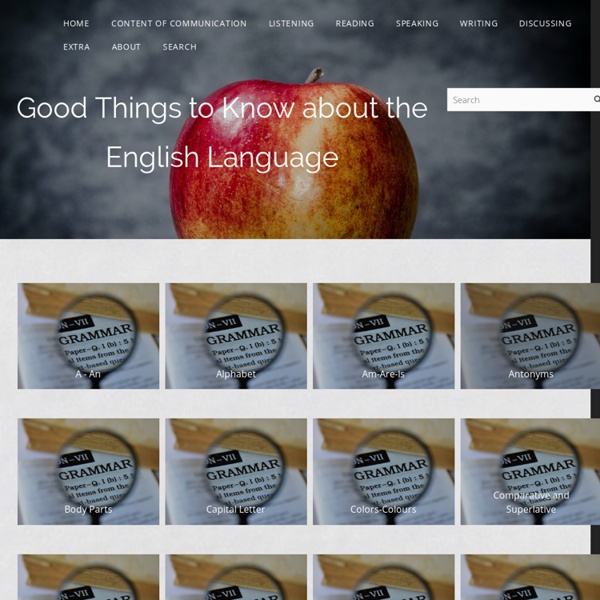



http://www.kimstudies.com/good-things-to-know-about-the-english-language.html
Related: Engelska • English grammar • EnglishBest Young Adult Novels, Best Teen Fiction, Top 100 Teen Novels It's almost a cliche at this point to say that teen fiction isn't just for teens anymore. Just last year, the Association of American Publishers ranked Children's/Young Adult books as the single fastest-growing publishing category. Which is why we were only a little surprised to see the tremendous response that came in for this summer's Best-Ever Teen Fiction poll. Lay vs. Lie (vs. Laid) - Grammar Rules Q: In the battle of lay vs. lie, when do you use each and can you provide examples? —Annemarie V. Don’t forget about “lain,” my friend! All these verbs have two things in common: They begin with the letter “L” and confuse the bejeezus out of many people. But here’s a simple breakdown that will hopefully help you decipher when to use each one and when to use their past-tense equivalents (I’ve also included a handy chart at the end to help, but we’ll get to that later).
Free Printable Bookmarks for Children We've got free printable bookmarks here for kids of all ages - great for teachers to hand out in class, parents to slip into a party bag, grandparents to use to encourage kids to read. There is nothing like an appropriate bookmark to prompt a child to turn the pages! We are constantly adding more bookmarks and have tried to include some for most of our themes and holidays, and to provide something for boys and girls of all ages. Please explore our printable bookmarks below! ..or Explore All Bookmarks Choose from two versions of these fun high frequency word bookmarks - one with white backgrounds, and one in full colour (as seen below).
Songs and Activities for English Language Learners Songs can be an effective way to introduce or reinforce a grammar topic. Click on the topics below for companion songs and activities. (In a blog article posted Oct. 4, 2016 at AzarGrammar.com, I list some of the benefits of using songs to teach grammar that I’ve observed in my own classroom.) Adjectives in the Song “True Colors”Adverb Clauses in the Song “Baby, I’m Yours”Comparisons with LikeFeel LikeGerunds as Objects of PrepositionsGerund or Infinitive after begin, start, continue, like, love, hate, can’t standGet to Do SomethingGotta: Informal Spoken English for Got ToInfinitives as AdjectivesI’ve Got It and I’ve Got ‘EmMust Have + Past ParticipleNoun ClausesParticipial PhrasesReflexive PronounsShould Have + Past ParticipleThird Person Singular: Mistakes in the Song “Memories” by Maroon 5Used to + a Verb in the Simple FormUsed to vs.
915 FREE Speaking Worksheets Learning to speak a new language is definitely a challenge. It’s very difficult for your students to do if they don’t practice on a regular basis. Luckily, you need to look no further because BusyTeacher.org has the tools to help your students practice their speaking - and want to do it, too! Let’s face it, students aren’t always jumping for joy at the opportunity to speak a language they aren’t 100 percent comfortable with. Students can be hesitant to speak for a wide variety of reasons - fear of mistakes, peer pressure, or lack of self-confidence are some of the main factors. BusyTeacher.org has 936 speaking worksheets to help you plan effective speaking lessons, which will get your students to break through their shyness and start talking!
DO vs MAKE - The Difference between Do and Make in English Do and Make are two verbs which frequently confuse students. Here we will learn about the difference between Do and Make and when to use each one. When do you use DO? DO is used as follows: 1. Halloween – Conversation.se – Dialoger på engelska Dialog 1 Person 1: – I’m having a Halloween party on Friday. Would you like to come? Person 2: – Yeah, sounds like fun. What time is it? Person 1: – It starts at 6pm and there will be food and drinks.
Uncountable Nouns wine joy music sugar happinesshairfun Types Uncountable nouns often fall into the following categories: Human feelings and qualities: joy, anger, cruelty, happiness, honesty, deceit, prideAbstract ideas: hope, peace, beauty, death, fun, life, musicSubstances: sugar, food, water, wine, salt, bread, iron, blood, money, gasActivities: work, help, sleep, travel, shopping Quantifiers We can use the following quantifiers with uncountable nouns: Do Does Did Done The word DO appears a lot in English. This is because it can be a verb TO DO (Do / Does / Did / Done) and can also be an AUXILIARY verb (Do / Does / Did). The Verb - To Do
Irregular Verb Page Englishpage.com's Irregular Verb Dictionary for English learners contains over 370 irregular verbs used in modern English as well as flashcards and exercises to practice those forms. To view our Extended Irregular Verb Dictionary, which contains over 470 verbs including rare and antiquated forms, Click Here. List of Irregular Verbs Irregular Verb Flashcards and Drills If you want to learn irregular verbs, you need to practice, practice, practice. Below we have created five sets of flashcards as well as simple irregular verb drills to help English learners learn the 100 most common irregular verbs in English.